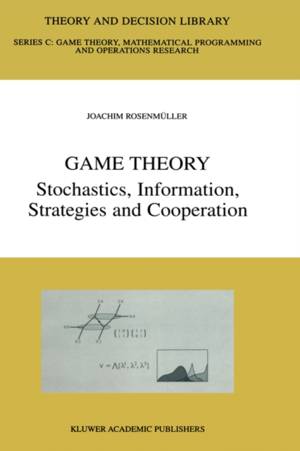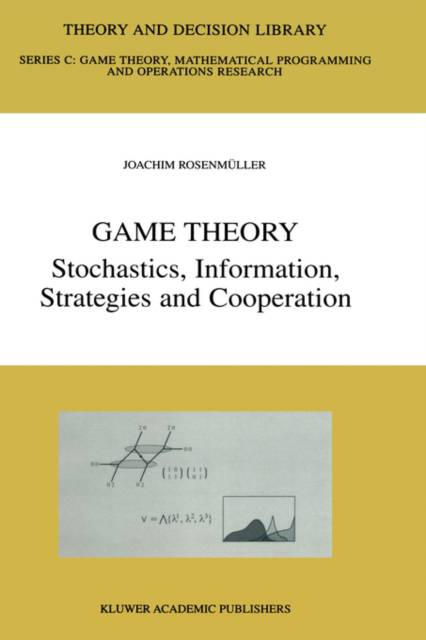
Bedankt voor het vertrouwen het afgelopen jaar! Om jou te bedanken bieden we GRATIS verzending (in België) aan op alles gedurende de hele maand januari.
- Afhalen na 1 uur in een winkel met voorraad
- In januari gratis thuislevering in België
- Ruim aanbod met 7 miljoen producten
Bedankt voor het vertrouwen het afgelopen jaar! Om jou te bedanken bieden we GRATIS verzending (in België) aan op alles gedurende de hele maand januari.
- Afhalen na 1 uur in een winkel met voorraad
- In januari gratis thuislevering in België
- Ruim aanbod met 7 miljoen producten
Zoeken
€ 391,45
+ 782 punten
Uitvoering
Omschrijving
Game Theory: Stochastics, Information, Strategies and Cooperation provides a discussion of some relevant topics in game theory. It is composed partially from material compiled by Professor Joachim Rosenmüller when lecturing at IMW, the Institute of Mathematical Economics at the University of Bielefeld. On the other hand, it also contains research topics that are not presented in a typical game theory textbook. Thus, the volume may provide the basis for an advanced course in game theory; simultaneously it may be called a monograph, and, as a third aspect, it also supplies some rather elementary versions of advanced topics of the field.
The volume has a non-cooperative and a cooperative part and in both of them the reader is assumed to have some basic knowledge in game theory, for instance, concerning the normal form (bimatrix games, Nash equilibria of the mixed extension, backwards induction in games with perfect information) on one hand and the coalitional function (simple games, convex games, superadditive games, the core, the Shapley volume) on the other hand.
Some emphasis is laid on the probabilistic background; however, the author treats stochastic games using the language of probability in order to consider simple models in which measure theory can be omitted.
The volume has a non-cooperative and a cooperative part and in both of them the reader is assumed to have some basic knowledge in game theory, for instance, concerning the normal form (bimatrix games, Nash equilibria of the mixed extension, backwards induction in games with perfect information) on one hand and the coalitional function (simple games, convex games, superadditive games, the core, the Shapley volume) on the other hand.
Some emphasis is laid on the probabilistic background; however, the author treats stochastic games using the language of probability in order to consider simple models in which measure theory can be omitted.
Specificaties
Betrokkenen
- Auteur(s):
- Uitgeverij:
Inhoud
- Aantal bladzijden:
- 662
- Taal:
- Engels
- Reeks:
- Reeksnummer:
- nr. 25
Eigenschappen
- Productcode (EAN):
- 9780792386735
- Verschijningsdatum:
- 31/12/1999
- Uitvoering:
- Hardcover
- Formaat:
- Genaaid
- Afmetingen:
- 156 mm x 234 mm
- Gewicht:
- 1115 g

Alleen bij Standaard Boekhandel
+ 782 punten op je klantenkaart van Standaard Boekhandel
Beoordelingen
We publiceren alleen reviews die voldoen aan de voorwaarden voor reviews. Bekijk onze voorwaarden voor reviews.









